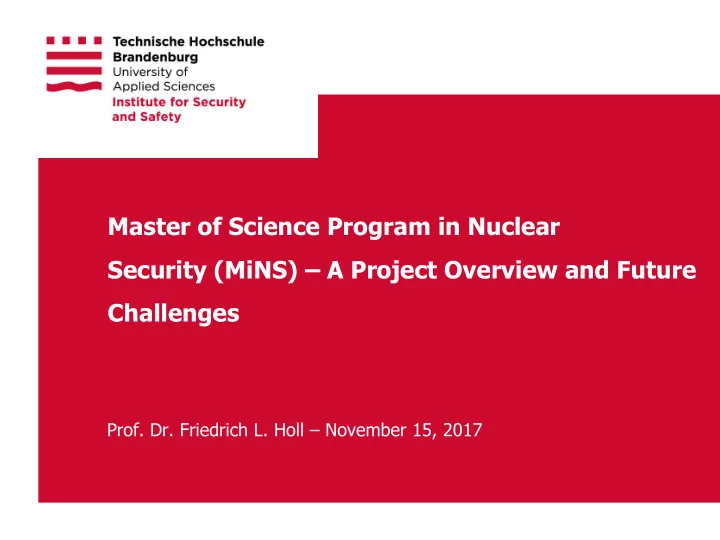

Master of Science Program in Nuclear Security (MiNS) – A Project Overview and Future Challenges Prof. Dr. Friedrich L. Holl – November 15, 2017 Technische Hochschule Brandenburg · University of Applied Sciences 1
Presentation overview MiNS at a glance • Concept and content • Program contributors • Educational partnerships • Certificate program • Web portal: www.mins.study Technische Hochschule Brandenburg · University of Applied Sciences 2 2
MiNS at a glance Master of Science (M.Sc.) from Brandenburg University of Applied Sciences English Required: Bachelor & work 90 ECTS points experience 3 terms (full-time) Digital distance and 6 courses 5 terms (part-time) e-learning Target group: e.g. international diplomatic staff, security professionals, employees of regulatory authorities, nuclear security/safety officers in national authorities, academia Tuition fees: 16,959 € Technische Hochschule Brandenburg · University of Applied Sciences 3 3
Innovative program Curriculum is based on the lessons learned from the pilot • EU program "Master in Nuclear Security“, the results of the internal revision process of IAEA NSS 12 and the teaching materials of INSEN Digital distance-learning Master provided as virtual • blended learning courses with “academic letters” (digital study material; online available) No presence at Brandenburg University required • Classroom courses of partner institutions can be integrated • Close cooperation with international experts from • renowned institutions (INSEN members) Technische Hochschule Brandenburg · University of Applied Sciences 4 4
Pedagogical concept: Virtual blended learning • Self-study (academic letters and e-learning modules) • Virtual classrooms and mentoring using web-based instruments such as • video-conferencing • e-learning systems with interactive functions • social media • Exams: • Online • At partner universities • Conducted by Goethe Institutes Provided by international partners Oriented according to different time zones Technische Hochschule Brandenburg · University of Applied Sciences 5 5
Program contributors • Dr. Johannes H. Sterba , Technische Universität Wien – Atominstitut, Austria (also a program co-manager) • Dr. Jason T. Harris , Purdue University, U.S. • Dr. Christopher Hobbs , King‘s College London, Department of War Studies, Centre for Science and Security Studies (CSSS), U.K. • Dr. Edward J. Waller , University of Ontario Institute of Technology, Canada • Dr. Craig M. Marianno , Texas A&M University, Department of Nuclear Engineering, and Nuclear Security Science and Policy Institute (NSSPI), U.S. Technische Hochschule Brandenburg · University of Applied Sciences 6 6
Curriculum Course Module ECTS Security Management Nuclear Security Management (e-learning course) 12 National Security and Counterterrorism International Law and Risk Threat Assessment and Planning 12 Assessment International Cooperation, Legal Framework and Governance Fundamentals of Mathematics Physical Protection (e-learning course) 12 and Technology Computer Security (e-learning course) Nuclear Security Nuclear Security in Transport and Storage 12 Detection and Response to Nuclear and Other Radioactive Material out of Regulatory Control Compulsory Facultative Courses Nuclear Forensics, Import/Export and Transit Control 9 (=electives) Mechanism and Regime, Nuclear Security at Major Public Events Research and Academic Research Paper 12 Working Project Master Thesis 21 Technische Hochschule Brandenburg · University of Applied Sciences 7 7
Outcomes for participants and employers MiNS prepares participants to use the appropriate • analytical tools to make thorough decisions in the various areas of nuclear security. MiNS students will receive solid knowledge in nuclear • security, which enables them to find synergy in thinking between security, safety and business, as well as risk management and corporate governance . MiNS will enable participants to work at a strategic • level within the field of nuclear security. MiNS is an effective way of educating and developing strategic talent and nuclear security managers in various functions. Technische Hochschule Brandenburg · University of Applied Sciences 8 8
How to participate × Pass the suitability procedure of uni-assist • (https://www.uni-assist.de) Cost 2017: € 75,00 • Processing time: 6 weeks to 3 months • Signing a contract between ISS and the student • 3 times € 5,653; must be paid before start of lectures • (access authorization per semester) Includes all study expenses (i.e. no additional cost for • examination) ISS assures the delivery of study content for 5 years • After signing the contract: • Possibility to apply for scholarships • Technische Hochschule Brandenburg · University of Applied Sciences 9 9
Scholarship opportunities EU CBRN Centres of Excellence (CoE) Groups of nation states in a region • can apply. Via regional Centre of Excellence in their region • IAEA and ISS could support such initiatives. • ISS could support the project management of such an • initiative and application. Successful implementation for the Asian region in the past. • Focus of CoEs is now on Africa. • Technische Hochschule Brandenburg · University of Applied Sciences 10 10
Nuclear security certificate program Besides the “full” Master’s program, we • provide bespoke certificates in nuclear security fitting individual needs. Each content module or course can be studied without the • formal prerequisites (bachelor degree etc.). Examinations need to be passed. • Certificates for modules can be used for a full MiNS study later. • Fee for certificate: 2,500 € (12 ECTS) • Outcome : individual composition of modules which strengthen the knowledge base of participants, widen their academic expertise and fulfill the regulatory requirements in terms of scientific education in nuclear security. Technische Hochschule Brandenburg · University of Applied Sciences 11 11
More information & contact Find more detailed information on www.mins.study There you can also find a contact form to request info on the application procedure for the next term (spring 2018) etc. MiNS – Point of Contact: Marco Macori ISS Research Fellow Email: macori@th-brandenburg.de Phone: +49 331 58148330 Technische Hochschule Brandenburg · University of Applied Sciences 12 12
Contact information Prof. Dr. Friedrich Holl, Co-Director, holl@th-brandenburg.de Guido Gluschke, Co-Director, g.gluschke@uniss.org Prof. Dr. Ivo Keller, Professor at Brandenburg University of Applied Sciences, ivo.keller@th-brandenburg.de Marco Macori, Research Fellow, macori@th-brandenburg.de Dmytro Cherkashyn, Nuclear Security Scientist, d.cherkashyn@uniss.org ISS Office phone: +49 331 58148330 Technische Hochschule Brandenburg · University of Applied Sciences 13 13
Thank you for your attention! Technische Hochschule Brandenburg · University of Applied Sciences 14
Recommend
More recommend